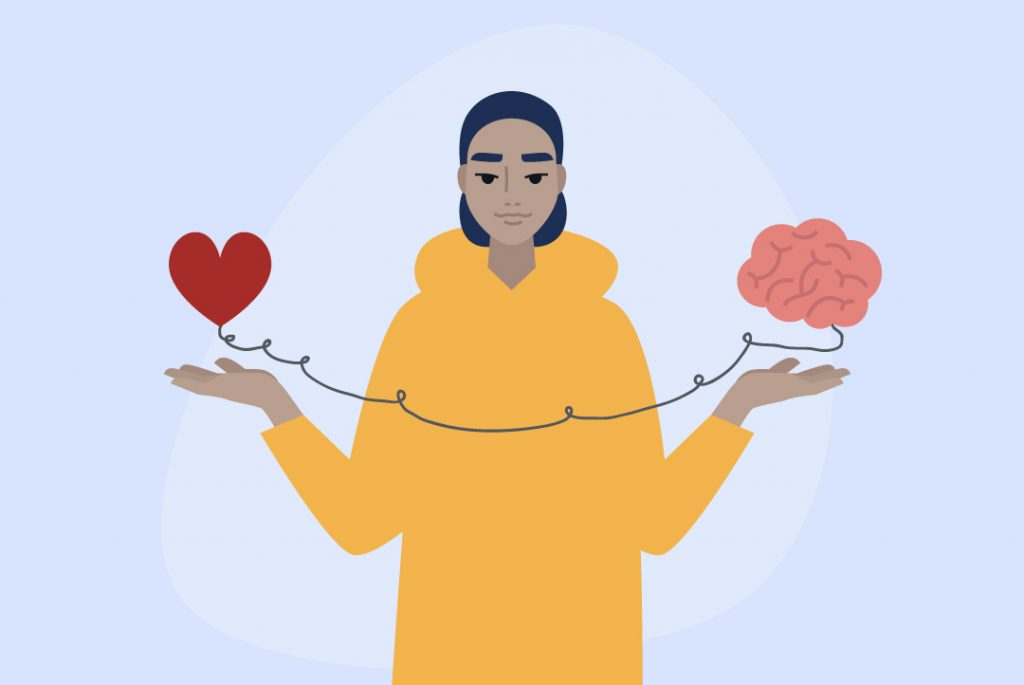EXPLORE MORE
MAY 2022
Make a healthy heart-mind connection
Your mental health affects how you think, feel, act and make choices. It can also have a profound effect on your physical health. Recent studies have shown that trauma, depression, anxiety and stress can have an impact on the body, especially the heart. It’s a connection worth exploring.
Looking for more? Find other articles below

What’s the link between mental health conditions and heart disease?
A growing body of research shows that certain mental health conditions can be risk factors for heart disease. People who struggle with depression, anxiety, stress or post-traumatic stress disorder (PTSD) for extended periods may experience a faster heart rate, high blood pressure, reduced blood flow to the heart and heightened levels of cortisol. Over time, these effects can lead to calcium buildup in the arteries, metabolic disease and heart disease.
Evidence also shows the reverse — that mental health conditions, such as depression, anxiety and PTSD, can develop after a major heart event, such as heart failure, stroke or heart attack. These conditions can be brought on by a variety of factors, including pain, emotional distress and financial stress.
Medicines used to treat mental health conditions may be another risk factor for heart disease. For example, the use of some antipsychotic medications has been associated with obesity, insulin resistance, diabetes, heart attacks, atrial fibrillation, stroke and death. Talk with your doctor about the risks and benefits of antipsychotic medications.
What mental health conditions are related to heart disease?
Some of the mental health challenges most associated with heart disease are:
- Mood disorders: Major depression or bipolar disorder that affects your psychological or emotional well-being nearly every day.
- Anxiety disorders: Responding to a person, object or situation with fear, dread or terror. These include generalized anxiety, social anxiety, panic disorders and phobias.
- PTSD: A condition that may follow a traumatic life experience, such as war, natural disaster or any other serious incident.
- Chronic stress: Constant, uncomfortable emotional stress that persists over an extended period. It’s accompanied by biochemical, physiological and behavioral changes.
What groups have higher rates of heart disease from mental health conditions?
- Veterans. Studies found that veterans are at a higher risk for heart disease, mainly due to PTSD resulting from combat.
- Women. Studies exclusively focused on women found that PTSD and depression may have damaging effects on physical health, particularly with increased risk for coronary heart disease-related illness and death. (Although men experience traumatic events more often, women are far more likely to be the victims of rape, sexual assault and sexual abuse as children, all of which are more likely to result in PTSD.)
- Couples with someone who has PTSD. Comparative studies found that couples in which one or both partners had PTSD experienced more severe conflict, greater anger and increased impacts on cardiovascular health than couples where neither partner had PTSD.
- Racial and ethnic minorities. Lastly, studies focused on how racial or ethnic minority groups are more vulnerable to depression, stress and anxiety. Due to inequities that affect health, adverse childhood experiences and racism/discrimination, some in this group could also be at a higher risk for hypertension, cardiovascular reactivity, heart disease and poor heart health outcomes.
How can you heal your own mind-heart connection?
If you, or someone close to you, is at risk for heart disease due to mental health challenges and other factors, get the help you need sooner, rather than later. See a mental health professional for help with your condition and focus on improving your emotional and physical well-being. Get more exercise. (Choose an activity you love and stick with it!) Eat a healthy diet. Quit smoking. And reduce stress with a mindfulness practice, such as meditation or yoga.
Source: Centers for Disease Control and Prevention (CDC). Heart disease and mental health disorders.
For a referral to a specialist or mental health support, the following resources can help. They are confidential and available to you at no extra cost.

